Best materials for paving - The expert guide to choosing the perfect surface for your patio
Everything you need to know about choosing the best paving surface for you

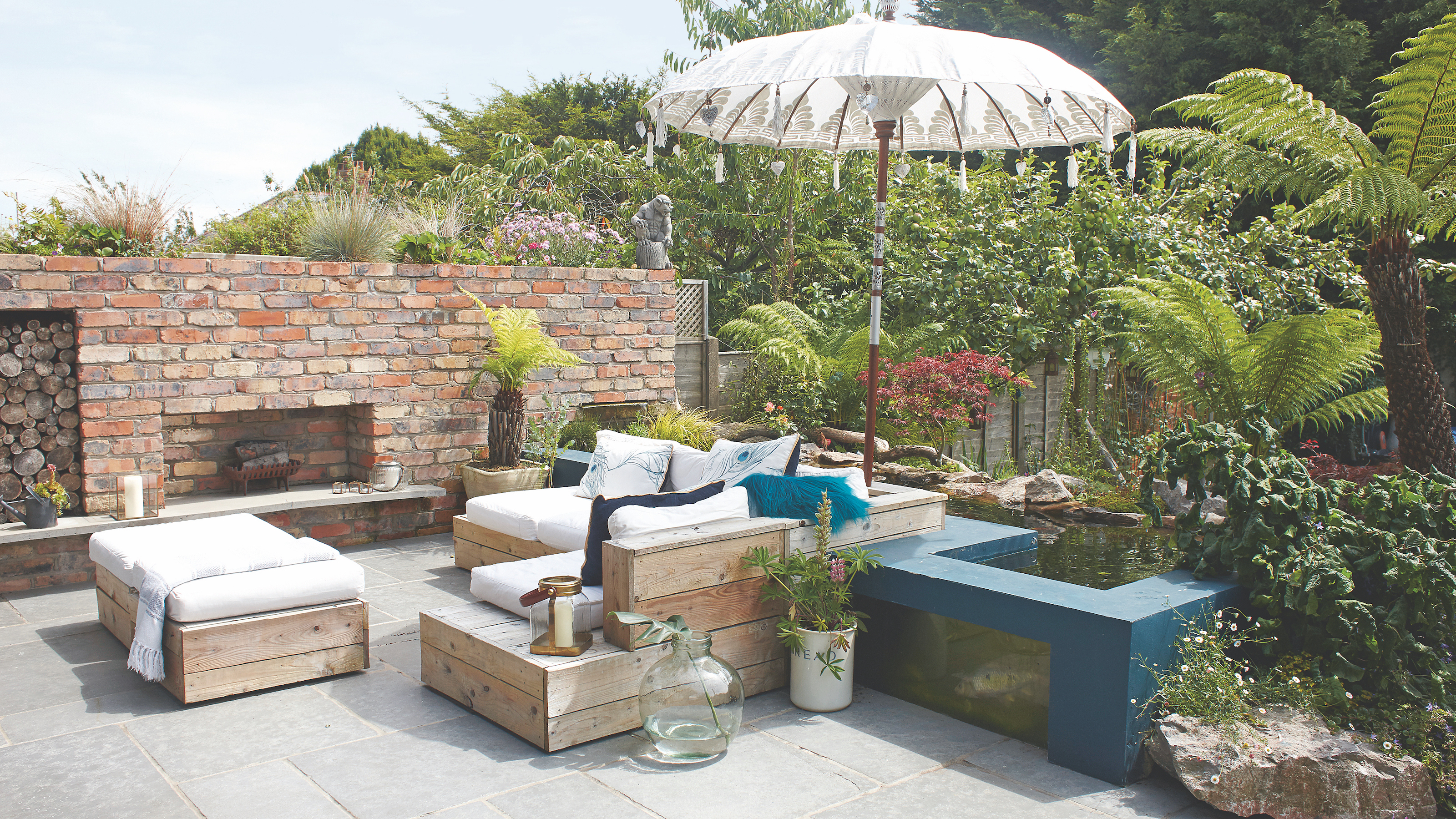
Sign up to our newsletter for style inspiration, real homes, project and garden advice and shopping know-how
You are now subscribed
Your newsletter sign-up was successful
EDITOR’S NOTE: An earlier version of this article included a quote from a purported expert whose credentials we have not been able to verify. The quote has been removed. We regret this lapse in our verification process and have updated our internal protocols to reduce the risk of recurrence.
If you've been scrolling through social media lately looking for ways to get your outdoor space summer-ready, you might be finding it hard to know which are the best materials for paving that will make a statement but still look good for years to come.
Luckily, we've done the hard work for you and gone to the experts to discover exactly which materials you should be looking for to create your dream patio ideas, the pros and cons or each and, of course, top tips to maintain your newly revamped outdoor space.
Best materials for paving
Giving your patio a refresh in time for summer might be at the top of your to do list this spring, but with so many different materials for patios to choose from it can be hard to know which one to opt for. Whether you're looking for a high-end finish or patio ideas on a budget, we've outlined the pros and cons of using each material to help you select the best one.
'Incorporating paving into garden design opens up a world of creative possibilities,' explains Dr Aidan Bell, co-founder of Envirobuild. 'Whether aiming for a traditional English garden charm or a contemporary outdoor oasis, thoughtful selection and placement of paving can elevate the overall aesthetic and functionality of any garden space.'
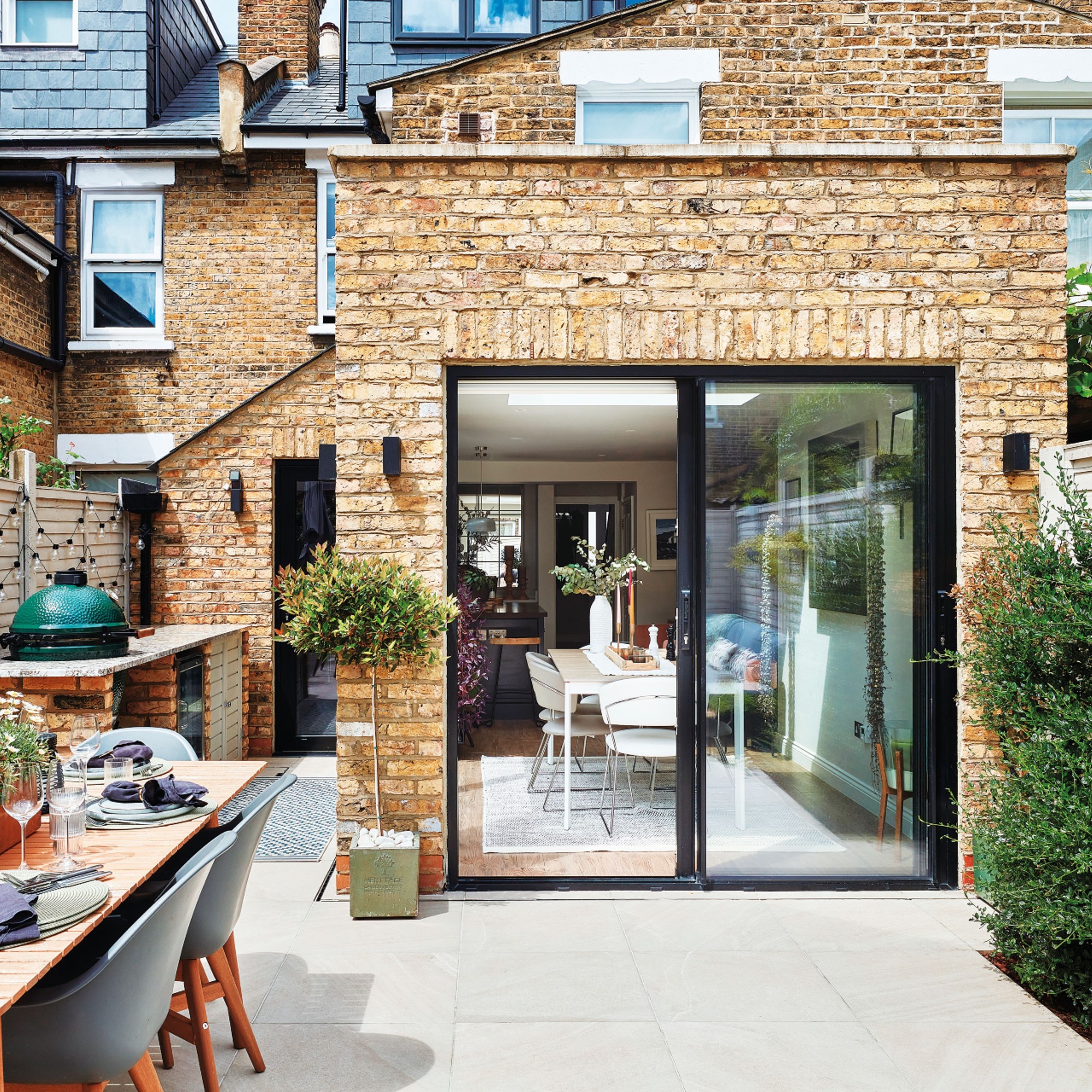
Porcelain – Best for low maintenance
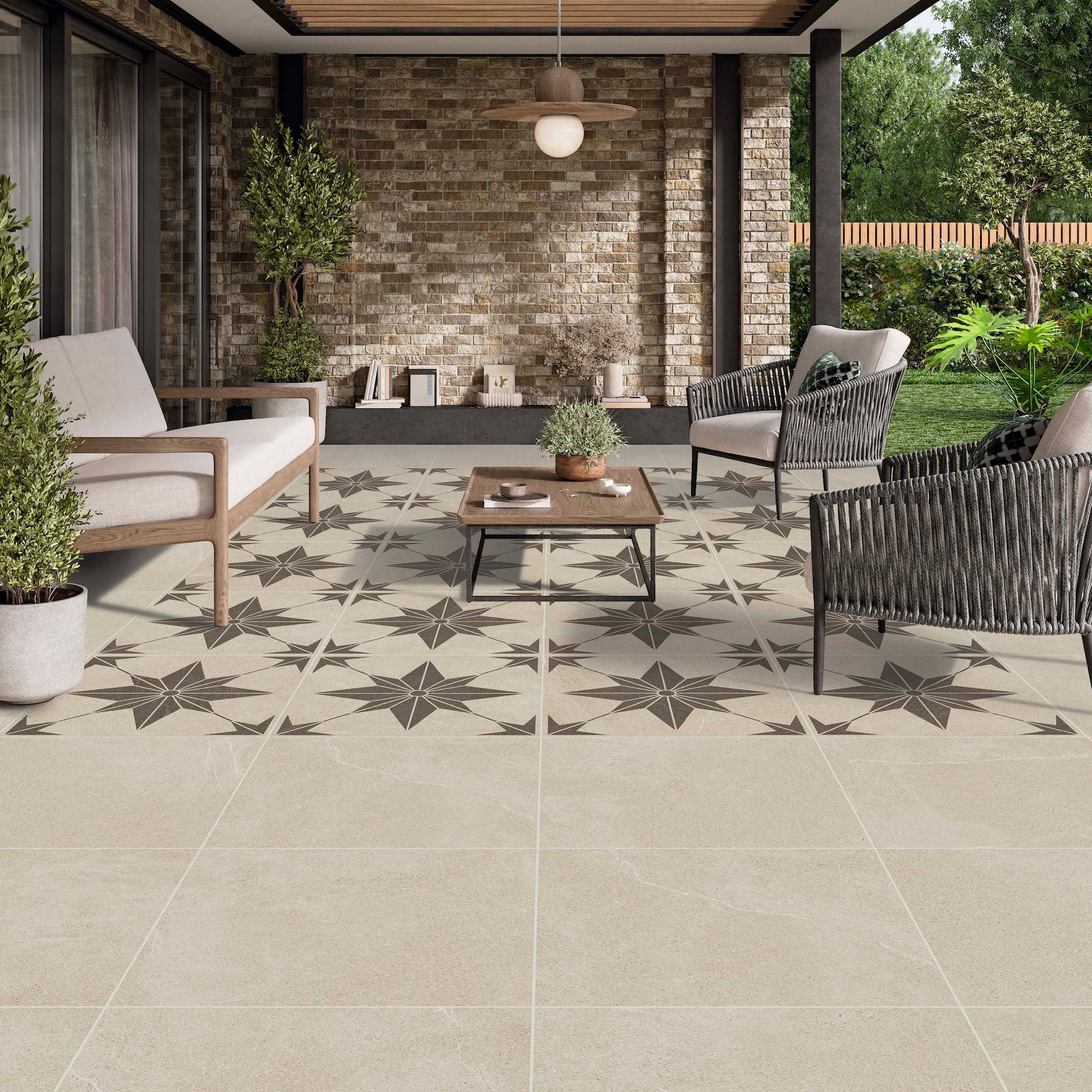
If you're looking for a material with a big range of designs to choose from as well as being super-easy to care for then porcelain is a top pick. 'Porcelain stands out as an optimal choice for paving due to its remarkable blend of durability, aesthetics, and practicality. Its exceptional strength and resistance to stains, scratches, and weathering make it a standout option,' explains Dr Aidan Bell.
Porcelain pros
- Affordability: 'While porcelain may have a slightly higher upfront cost compared to some other paving materials, its long-term cost-effectiveness becomes apparent through its minimal maintenance requirements and longevity,' explains Dr Aidan Bell. 'With porcelain, you're investing in a paving solution that lasts for decades, ultimately saving on replacement and repair expenses.'
- Different finishes: 'Porcelain's versatility extends to its ability to mimic various textures, including natural stone, wood, and even concrete,' adds Dr Aidan Bell. 'This versatility allows homeowners to achieve their desired aesthetic without sacrificing durability or practicality.'
- Easy to maintain: 'More durable than the natural stone and timber they replicate, outdoor porcelain slab tiles do not require post-installation sealing, have in-built UV protection that will prevent them from fading in direct sunlight, and will not absorb water or be susceptible to staining from organic matter such as leaves/moss,' explains Colin Lincoln-Evans, buyer at Tile Mountain.
Porcelain cons
- Expensive: 'While the initial investment in porcelain tiles can be higher compared to other outdoor flooring options, it's important to recognize the long-term benefits they offer,' explains Molly Woodward-Moor, creative director at Stone Superstore. 'Their enduring strength and minimal maintenance requirements prove cost-effective over time.'
- Installation: 'Porcelain paving may require professional installation due to its precise fitting and handling requirements,' adds Dr Aidan Bell.
Sandstone – most natural look

For a more natural, country garden sandstone is a good material for a patio. 'Its rustic appearance, rich in texture and character, adds subtle warmth to outdoor spaces, making it an ideal option for homeowners looking to enhance the natural ambience of their gardens, pathways and patios,' explains Molly.
It also has other benefits: 'It is easy to clean, easy to maintain and one of the cheaper real stone options,' Baz Grainger, Landform Consultants and designer of the Killik & Co garden at Chelsea Flower Show this year.
Sign up to our newsletter for style inspiration, real homes, project and garden advice and shopping know-how
Sandstone pros
- Durability: 'It requires minimal maintenance and can be cleaned with water and an appropriate mild detergent, while regular sweeping and sealing will help to prolong its lifespan and maintain its appearance,' advises Molly.
Sandstone cons
- Pavers may stain: 'It's important to note that the porous nature of genuine Sandstone makes it prone to liquid absorption and staining, however, regular cleaning and appropriate sealing will prevent issues like discolouration and weathering,' adds Molly.
Limestone – Best for texture
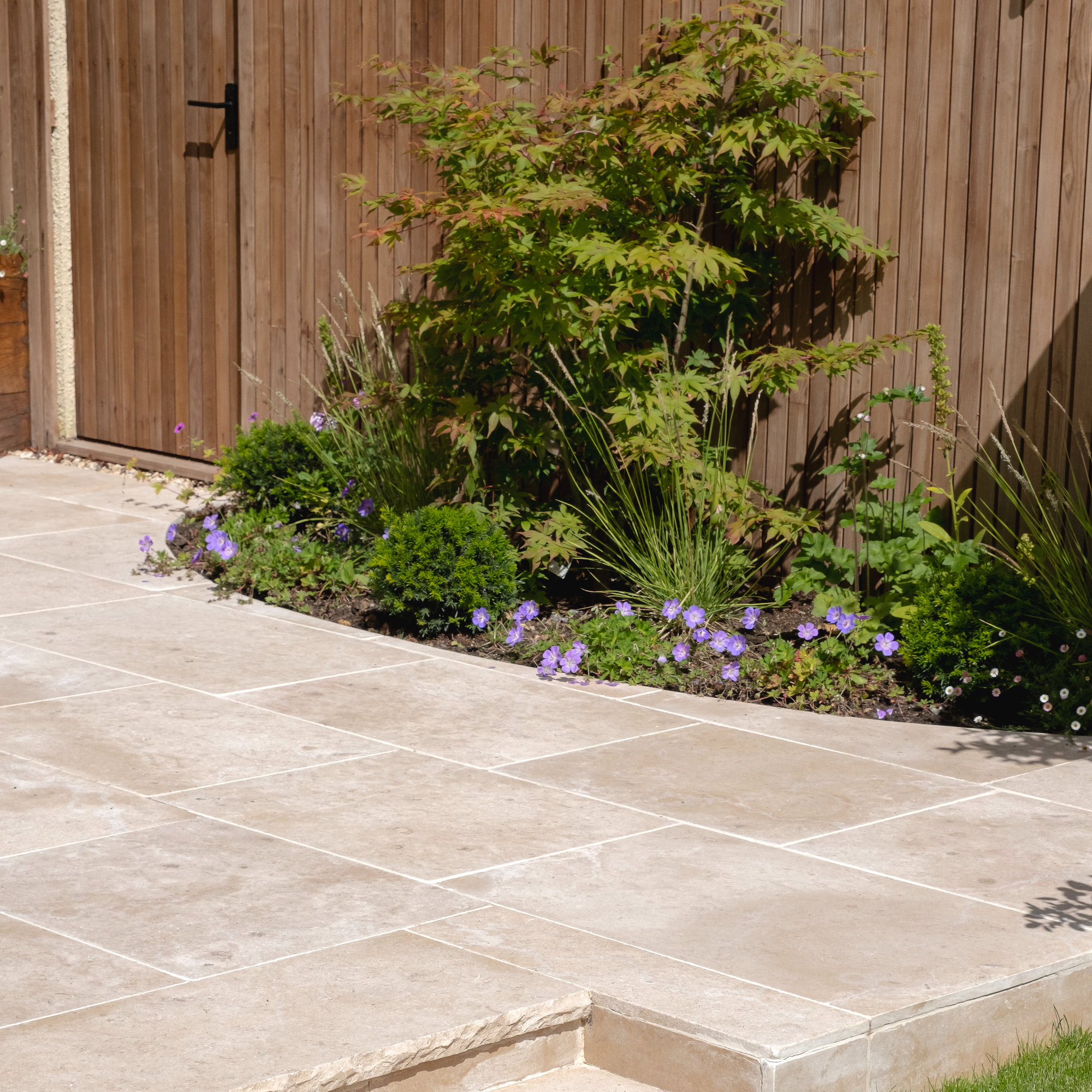
Renowned for its stylish qualities, limestone is also popular thanks to its anti-slip properties due to its textured finish. 'Limestone offers a classic and elegant look,' explains Glen Peskett, home DIY expert and owner of Saxton Blades. 'It's typically more affordable than other natural stones.'
Limestone pros
- Durability: 'Limestone is durable, easily maintained and can handle outdoor elements as well as daily foot traffic, ensuring practical longevity. The low water absorption of limestone tiles reduces the risk of damage caused by freeze-thaw cycles,' advises Molly.
Limestone cons
- Surface wear: 'Limestone is durable but may be prone to scratching and can be more susceptible to staining than some other materials.' advises Glen.
- Limited colour options: 'Being a natural-forming stone, Limestone is relatively limited when it comes to colour options, typically only available in neutral tones such as grey, beige and cream, potentially limiting the design possibilities of an outdoor space,' says Molly.
Slate – For a unique appearance
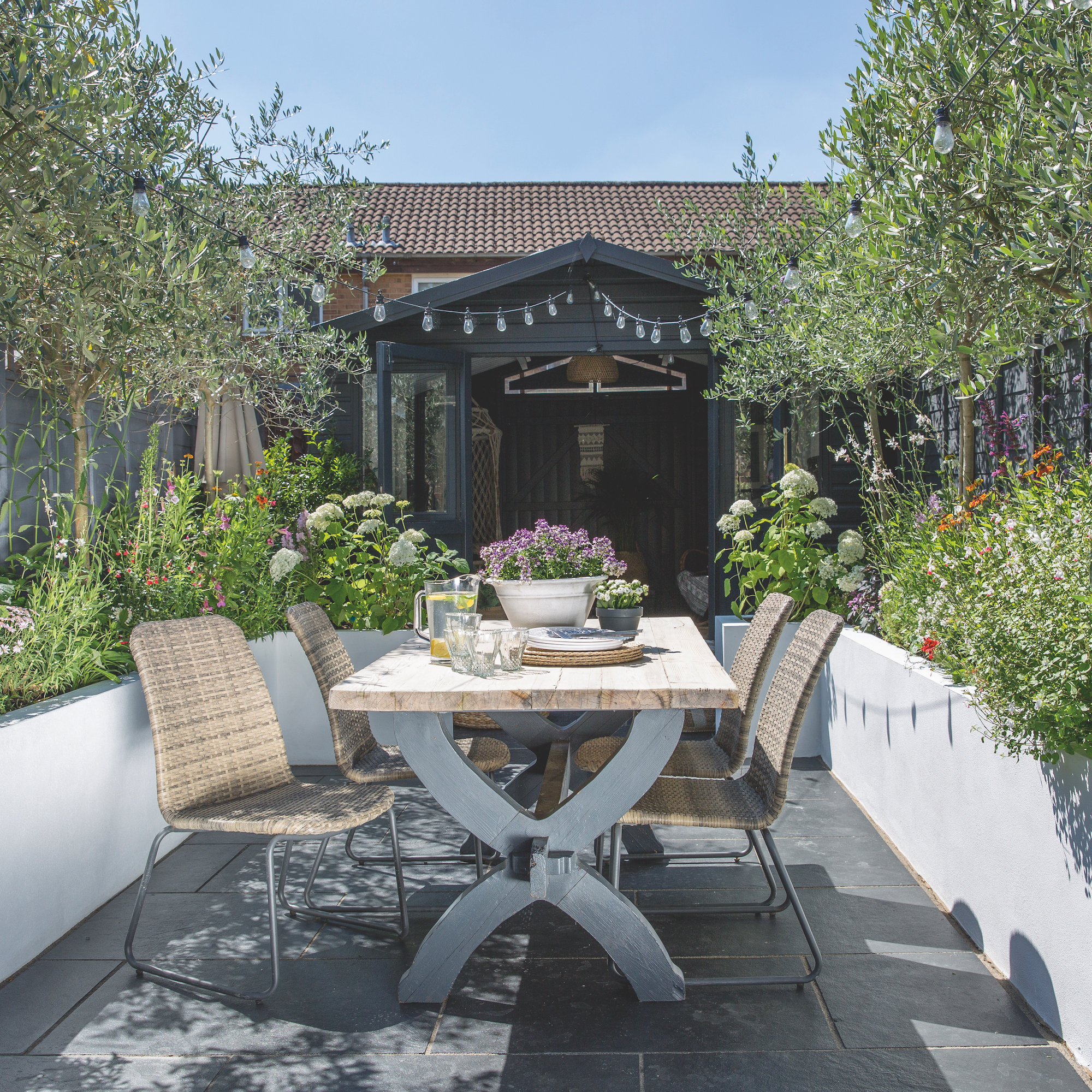
The unique appearance of slate is what often makes it a popular choice for paving. It is a non-porous material that works well in patios
It can be used as slabs or as flagstones, and you can choose between smooth or textured finishes. It is the perfect match for modern and traditional gardens.
Slate pros
- Unique appearance: 'Slate is a good option for those seeking visual appeal due to its unique texture and colour,' explains Molly. 'Unlike some other natural materials, such as wooden decking, its colour doesn’t fade as quickly, making it a long-standing and attractive choice.'
Slate cons
- Expensive: 'While slate is a fantastic, timeless option it can tend to be on the more expensive side, typically requiring professional installation to ensure its longevity and stability,' adds Molly.
Paving blocks – best for pattern
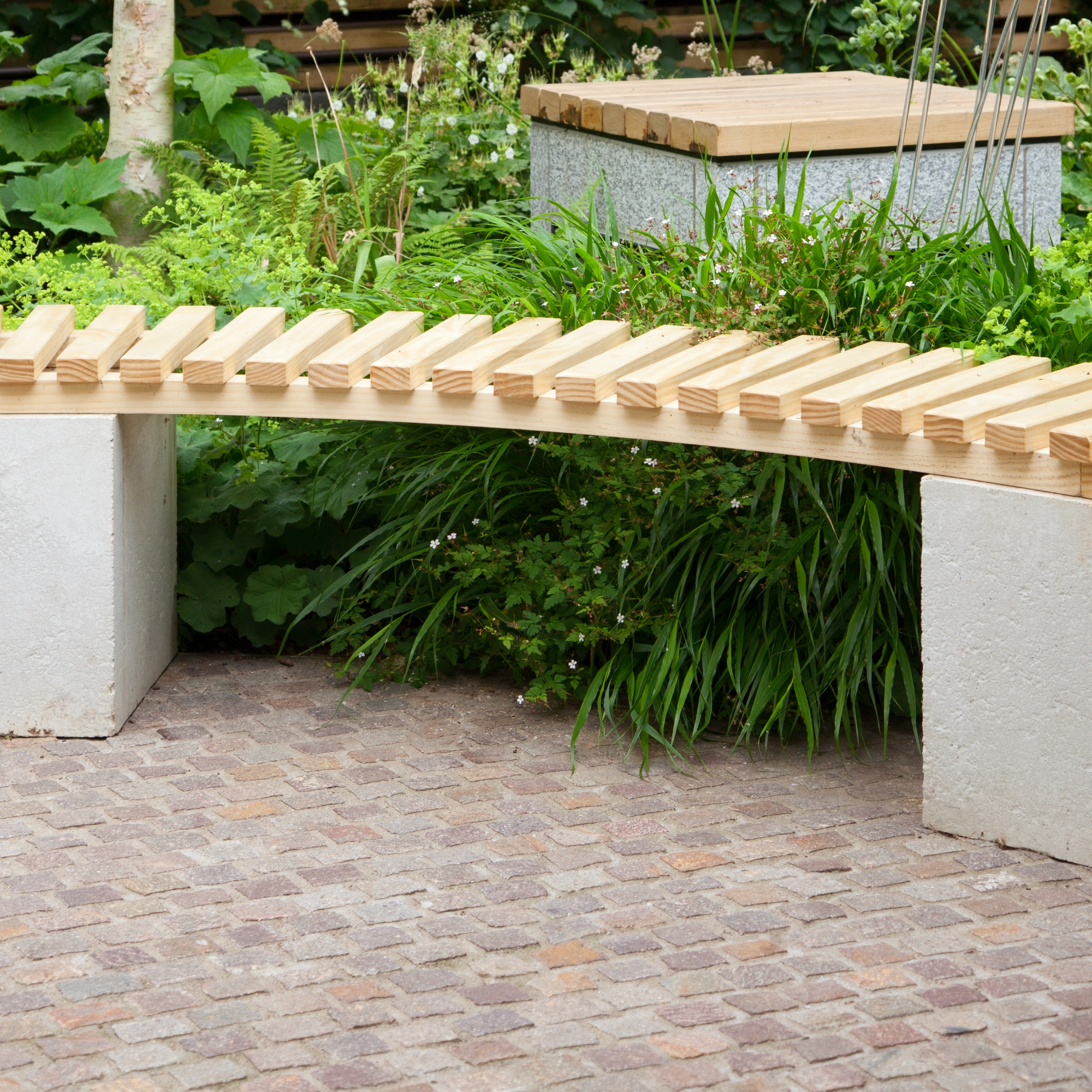
If you want more options design wise, paving blocks can be very versatile as they can be laid in many different patterns for a unique finish. They can also be easily laid without the need for a professional. 'Due to its ease of installation compared to other materials and most homeowners tend to lean towards DIY installation, due to the cost savings,' explains Molly.
Block paving pros
- Easy to replace broken blocks: 'Paving blocks are highly durable and are also resistant to weathering,' explains Molly. 'If a paving block does become damaged, it can be easily replaced without having to remove the entire paved area, making repairs simple and cost-effective.'
- Versatility: 'Paving blocks are an extremely common element of people’s gardens and that is largely because they offer a wide range of design possibilities, allowing for various patterns and styles to complement different garden aesthetics.' explains Tom Allen, owner of TGA Concrete Pumping.
Block paving cons
- Weed growth between blocks: 'The joints between paving blocks can provide space for weeds to grow, especially if they are not tightly packed or filled. Regular maintenance such as weeding is essential to prevent weed growth,' explains Molly.
- Maintenance: 'The blocks will require periodic cleaning and sealing to maintain their appearance and reduce wear and deterioration,' advises Molly.
- Cost: 'One of the main drawbacks of paving blocks is their initial cost, which can be higher compared to other garden surfacing options,' adds Tom. 'The expense includes both the materials and professional installation, especially if you choose intricate designs or premium-quality blocks.'
Concrete pavers – Most budget-friendly
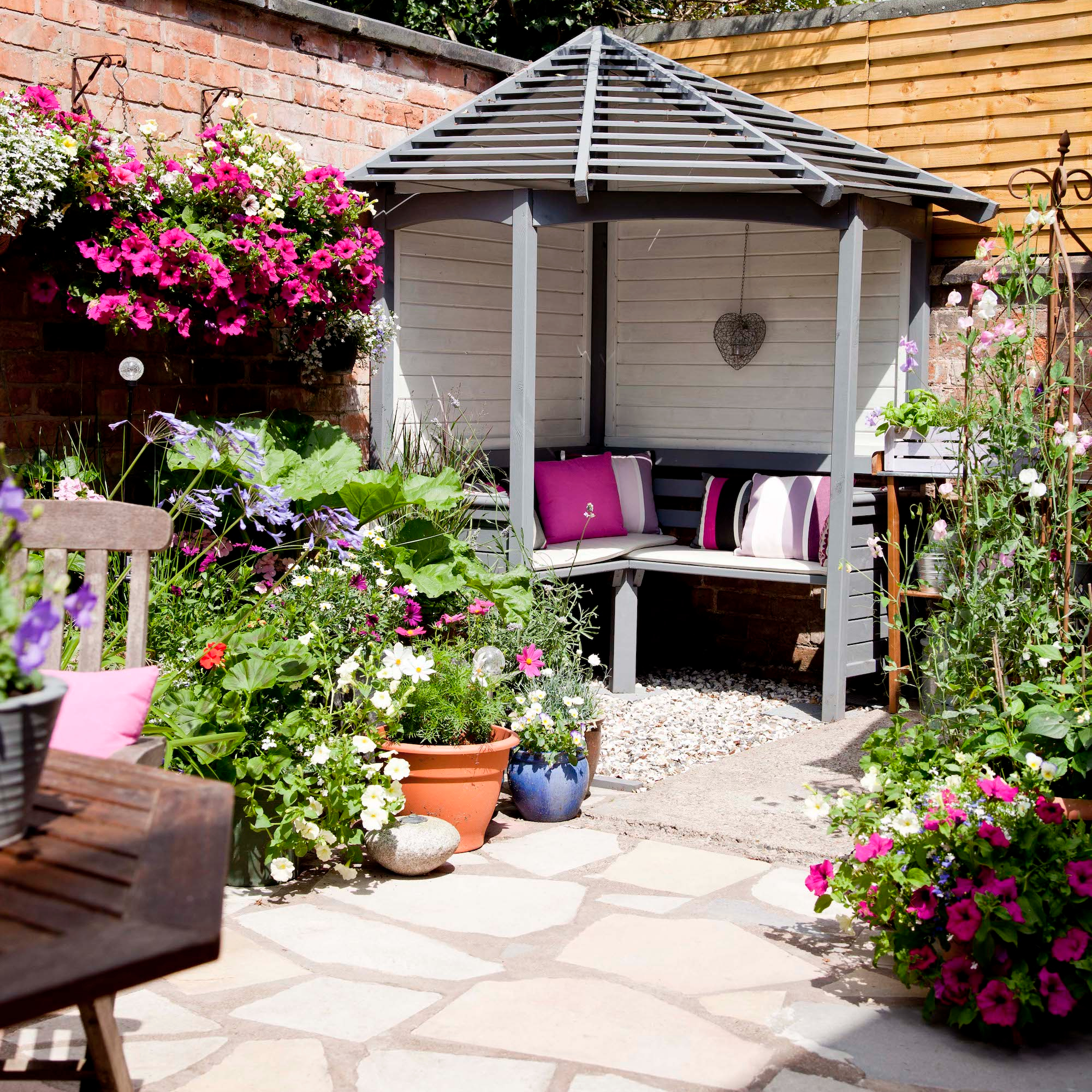
When it comes to a budget-friendly paving option, concrete pavers are one of the cheapest materials. 'For those looking to create a functional patio in their garden, ideally, you want to opt for a material that is not only durable but also low maintenance,' explains Alice Turner, head of product at Marshalls.
'Concrete paving slabs are the perfect option for a patio, as they come in a range of colours and styles to suit your needs while requiring little to no maintenance, meaning your patio area can be appealing all year round.'
Concrete pros
- Durability: 'Concrete slabs are highly durable and can withstand various weather conditions that are common in the UK, such as rain and frost, without deteriorating quickly,' explains Tom.
- Low maintenance: 'Once installed, concrete slabs require minimal maintenance compared to other materials like wood or gravel. They are easy to clean and typically only require occasional sweeping or pressure washing,' adds Tom.
- Versatility: 'Concrete slabs come in various sizes, shapes, and finishes, offering versatility in design options for your garden patio or pathway,' says Tom.
Concrete cons
- Lack of aesthetics: 'Concrete slabs may not offer the same aesthetic appeal as natural stone or wood, which can impact the overall look and feel of your garden,' explains Tom.
- Surface heat retention: 'In warmer weather, concrete slabs can absorb and retain heat, making them uncomfortable to walk on barefoot during hot summer days,' warns Tom.
FAQs
What is the best material to use for a patio?
Your choice may depend a lot on budget. While porcelain is popular due to its versatile designs and easy maintenance, it comes at a cost. Natural stones can need a little more TLC to keep them in top condition, but for a budget-friendly option, garden design expert Fiona recommends concrete pavers.
'Paver materials all come with their pros and cons, so what’s best to use really depends on your needs. If you’re aiming to keep costs down, then concrete pavers are going to offer you the best value without compromising on durability. They come in all different shapes and styles and can mimic natural stone, so they needn’t look cheap.'
What is the best low-maintenance paving?
For a paving material that's really easy to care for, James Ewens, commercial director at Alexander Francis picks porcelain. 'It’s difficult to say which material is best for pavers as it can vary depending on the kind of look and texture you’re going for, however I would have to say when it comes down to it that porcelain is definitely worth the price.'
'While they do demand a higher investment than other pavers, they are extremely durable and not something you’re going to have to worry about replacing anytime soon.'
With all the pros and cons weighed up for you, it's now simply up to you to work out what matters most be it pattern, budget or low-maintenance.

Amy Hodge has been working on interiors magazines for over 11 years. She's a freelance writer and sub editor who has worked for some of the UK's leading interiors magazines including Ideal Home, Style at Home and Country Homes & Interiors. She started at Style at Home just after it launched as food editor and is now chief sub editor for Ideal Home, Style at Home and Country Homes & Interiors.